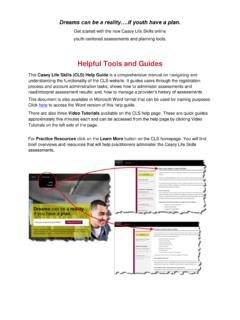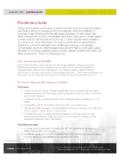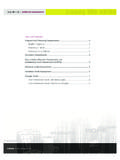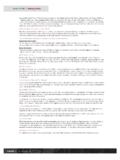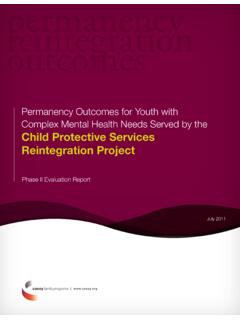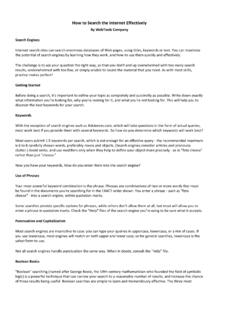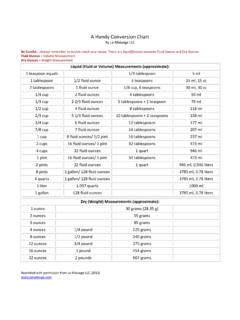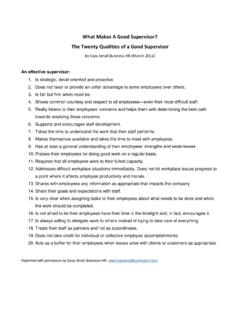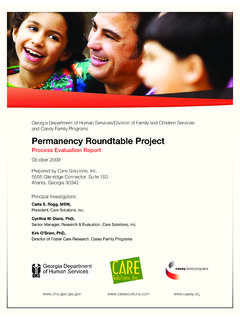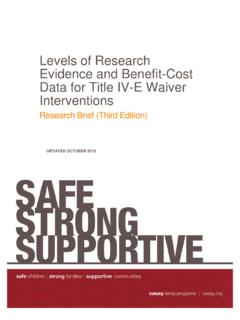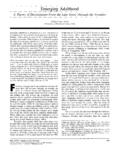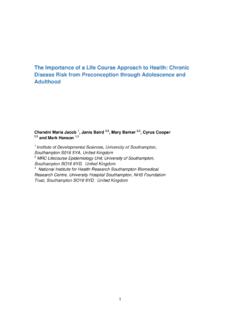Transcription of MONEY HOME AND FOOD MANAGEMENT - Casey Family …
1 1 Preparing Adolescents for Young adulthood (PAYA) Module I MONEY HOME AND FOOD MANAGEMENT Handbook for Skill Development Massachusetts Department of Social Services 2 PAYA MODULE I Introduction elcome! The topic areas you ll be working on in this booklet include such vital independent living skills as education, job seeking skills, and job maintenance skills. Each topic area includes sections for easy use: Assessment and Activity/Resource Workbook. The Assessment will help you determine your skill level in each topic area and target those skills in need of further development. The Activity/Resource Workbook contains information and exercises for each of the topic areas to help you develop or strengthen your independent living skills. As you move from one skill topic to the next, you will be increasing your understanding of the fundamentals of independent living and enhancing your abilities to make a successful and smooth transition to self sufficient young adulthood .
2 Remember, it s your future! Good luck and enjoy yourself! W 3 Independent Living Skills Module I INDEX MONEY MANAGEMENT .. 4 Home MANAGEMENT .. 120 Food MANAGEMENT .. 128 4 Personal Budget In this next section, we will work on establishing a personal budget. Each individual s personal budget will be different, reflecting his/her income, needs, lifestyle, preferences as well as where a person resides. Rents for apartments tend to be more expensive in a city or highly populated area close to the city. On the other hand, rents tend to decrease as you get farther from the city because there is less accessibility to places of entertainment as well as limited public transportation. Before beginning to work on your personal budget, take a look at two examples of financial planning -- Peter and Diana s personal budgets Peter Peter, 19, lives in a two bedroom apartment, which he shares with his roommate.
3 They split the cost of rent ($800 per month) and utilities (hot water is included in the rent). They each pay their own phone bill. Peter has a girlfriend who lives in another town and often calls her long distance. Peter and his roommate keep a phone log and each of them is responsible for the expenses of their calls. They go grocery shopping together and share the cost of food. Peter and his roommate take turns cooking meals. Peter works full-time (40 hours a week) at a gas station and makes $ an hour, about $300 a week or $1,200 a month ($14,400 a year, before taxes). Based on the expectation that 33% of his salary will be deducted for taxes, Peter will have $804 to spend each month. Peter s job does not offer health insurance so he needs to pay for all medical expenses out of his income. He enjoys taking his girlfriend to the movies and going out to dinner once in a while. Presently, Peter is saving some of his income to purchase a car.
4 After considering each budget item individually, Peter has set up a budget for himself which looks like the following: Diana Diana, 18, lives in a studio apartment by herself in Spencer (a town approximately 15 miles from Worcester, MA). Her rent is $675 a month, including all utilities except for her phone bill. Diana recently completed a Nurse s Aid Certification course and is presently working at a nursing home full-time (40 hours a week). Diana makes $ an hour and gets paid bi-weekly. Therefore, she receives $ every 2 weeks before taxes, which is $ per month or $ a year. After taxes, her bi-weekly paycheck equals $ Through her job, Diana receives benefits including medical and dental insurance as well as sick and vacation pay. Diana bought a car six months ago, which she uses to drive to and from work daily. Diana likes to buy new clothes and is a member of the local health club.
5 She is presently saving some of her income to continue her education at the community college in order to become a nurse. Diana has set up a budget for herself which looks like the following: 5 Peter s Monthly Budget Diana s Monthly Budget Income (After Taxes): $804 Income (After Taxes): $1,289 Rent one half $400 Rent one half $400 Utilities (gas, oil, electric) $ Utilities (gas, oil, electric) $ 0 Phone $ 40 Phone $ 60 Food $100 Food $200 Home Care $ 18 Home Care $ 25 Personal Care $ 20 Personal Care $ 25 Medical Care (inc. prescriptions) $ 10 Medical Care $ 0 Insurance (auto, home, renter s) $ 0 Auto Insurance $100 Transportation $ 30 Transportation $ 60 Clothing $ 30 Clothing $ 54 Recreation $ 25 Recreation $ 10 Savings $ 13 Taxes $ 0 Additional Taxes $ 0 *Cable (luxury) $ 55 *Cable (luxury) $ 28 *Cell Phone $ 0 *Cell Phone $ 25 Misc. (Health Club) $ 20 Miscellaneous $ *These items are not necessities.
6 If you can fit them into your budget, fine; if not, you might have to go without them until you can properly afford them. You can also look at prepaid cell phones as an option to a contract cell phone and buy the least expensive cable package until you can afford an upgraded one. If you compare Peter and Diana s budgets, it becomes obvious that budgets can be flexible in order to accommodate each person s lifestyle. As stated earlier, some budgeting items like recreation, transportation, and savings are more flexible than rent and utilities. While establishing your personal budget, you need to keep in mind how your preferences and lifestyle might influence your own budget. In the next section, we will work on establishing a personal budget using a monthly income of $ , the approximate amount you would earn each month working 40 hours a week at $ an hour. Before you fill out the complete budget below, you will need to complete the individual item sections and place the final amounts in the appropriate labeled box on the My Personal Budget page.
7 MONEY MANAGEMENT SKILL ASSESSMENT NOTE: It might be helpful to use a calculator on this next section. If you haven t used one before, ask your social worker, foster parent, or staff to teach you. 6 The following questions will help you identify MONEY MANAGEMENT skills in which you excel and target those which you need to develop. By yourself or with your team try to answer each of the questions as honestly as possible. After completing this independent living skills assessment, review it with your team and identify those skills you would like to strengthen. I do not know how to do this I need to know more about this I can do/ have done this 1. Know how to add, subtract, multiply, and divide using a calculator. 2. Can make purchases using the correct amount of MONEY and can determine when I receive correct change from a purchase. 3. Know what the basic necessities for daily living are (food, housing, transportation, clothing, etc.)
8 And am aware of their costs. 4. Can set up and follow a monthly budget which includes the basic living expenses. 5. Can manage unexpected bills or financial emergencies and keep within my budget. 6. Know how to open a savings account, make deposits and withdrawals, and read a passbook/balance statement. 7. Understand what a MONEY order is and know where and how to purchase 8. Know how to open a checking account, write checks, make deposits and withdrawals, and accurately record each transaction. 9. Can read monthly bank statements and balance my checkbook. 7 I do not know how to do this I need to know more about this I can do/ have done this 10. Am able to regularly put aside some MONEY for savings. 11. Know how much MONEY I will need for independent living start-up costs and have established a savings plan accordingly. 12. Know the meaning of the words gross and net in reference to a paycheck and understand all the deductions, federal tax, state tax, FICA, etc.
9 That are itemized on my pay stubs. 13. Understand that by law I must file federal and state tax forms and know how to get assistance to complete them. 14. Know the value of using coupons and looking for sale prices when shopping. 15. Can recognize deceptive or misleading advertising. 16. Know the importance of comparing prices by using unit pricing when shopping. 17. Know when and how to say no to friends wanting to borrow MONEY . 18. Know the basic concepts of credit, loans, and interest. 19. Understand how to avoid late payment penalties when making purchases by credit. 20. Know the general costs of utilities and can make informed decisions about their usage. 21. Understand what problems are created when a bad credit rating has been established and know how to avoid one. 8 MONEY MANAGEMENT and Budgeting Managing MONEY appropriately is probably one of the most important independent living skills.
10 In the following section, we will work on MONEY MANAGEMENT and budgeting. Even if you do not have a regular income or live independently at this point, the information will be helpful to you in planning for the future. The way you spend your MONEY now is probably a good indicator of what you will do with your MONEY later on. In the following exercise, evaluate your spending habits. Circle the item which best reflects the way you spend MONEY . Do You Usually Save most of your MONEY - Spend most of your MONEY Buy things you need - Buy things you like Spend most of your income as soon as you get it - Budget your MONEY so it will last Plan for purchases - Buy impulsively Keep track of your MONEY - Don t know where your MONEY goes Another step to evaluating your spending is to establish exactly where all your MONEY is going. Some of you may not be aware of where all your MONEY is going. Do you feel as if your income simply disappears?
